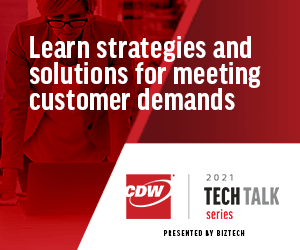How to Steer Your Organization Toward Being More Data-Driven
Many businesses looking to build data programs may lack the operational management needed to implement a data-driven vision, and their technology leaders may be left wondering how to make it happen.
Clingerman offered this advice: “Look to see what’s happening within your industry verticals and competition. Where are others taking advantage of data?”
He cited Uber as a prime example of a small startup that was able to harness the data collected out of the application it built. Upon discovering that many customers were using Uber as transportation to and from restaurants, the data the company collected enabled it to create a whole new line of business with Uber Eats.
The vision and cultural aspects of an organization are what allow a business to take this data and use it to realize the promise of AI.
Using AI to Enhance Culture and Quality of Life
Clingerman mentioned several examples of how AI has recently been harnessed to benefit society. In the transportation sector, autonomous cars have helped to enable safer transportation. In agriculture, sensors placed on farm equipment have been used to maximize crop yields. AI has been used to power smart cities, ensuring safer, more secure cities and more reliable public transportation.
However, with all the data organizations are contending with, Clingerman said it’s absolutely critical for organizations to consider ethics when deciding how to harness and use that data.
“How do we use this data only for good? How do we ensure that it’s safe and secure? How do we anonymize the information as much as possible?” he asked. “All of our decisions are focused on how organizations leverage technology to drive human progress forward. It’s not about the technology. What are we doing to better our society?”
Business Diversity Is an ‘Absolute Revenue Enabler’
Kristin Malek, director of business diversity at CDW, also joined the session to speak about the ways in which procurement and supply chain management can provide opportunities for businesses looking to prioritize positive societal and economic impacts in their decision-making.
She quoted a January 2020 Deloitte study, which notes that “The term ethical technology refers to an overarching set of values that is not limited to or focused on any one technology, instead addressing the organization’s approach to its use of technologies as a whole and the ways in which they are deployed to drive business strategy and operations. Companies should consider proactively evaluating how they can use technology in ways that are aligned with their fundamental purpose and core values.”
“There is a real-time demand in our country and beyond for equity in the workplace, in the workforce and in our new digital supply chain,” Malek added.
She emphasized that in 2021, business diversity and supply chain diversity aren’t just nice to have. “It’s not charity, it’s not sprinkling kindness throughout. It is an absolute revenue enabler.”
“We’re all looking for a promise of progress,” she said. Business diversity is about realizing that progress through decision-making that factors in social responsibility and supply chain choices that employ “impactful sourcing and intentional procurement, because instead of tracking dollars spent, we need to be tracking the lives that we’re enriching.”
“So, what’s on the table? What’s the business case?” she asked, noting the many competing strategies all organizations are focused on right now. “It’s meaningful job creation, it’s revenue enablement, it’s greater market share — and it’s done with sustainable and ethical procurement.”
Follow BizTech’s full coverage of the CDW Tech Talk series here. Insiders can register for the event series here.











